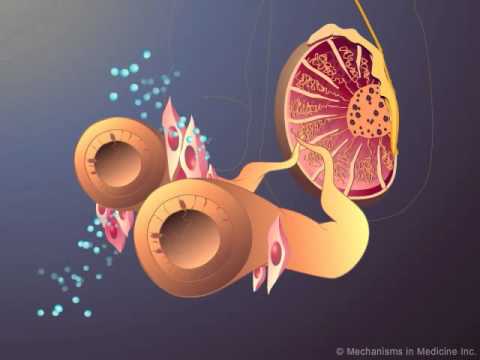Testosterone and Fertility: How They Are Linked and How to Improve Both

Understanding the Role of Hormones in Fertility

Hormones play a vital role in the intricate process of fertility. From the onset of puberty to menopause, hormones, such as estrogen and progesterone in women, and testosterone in men, orchestrate various reproductive functions. These hormones are produced by the ovaries and testes, and they regulate the menstrual cycle, ovulation, and sperm production. Understanding how hormones function in fertility is crucial for both couples who are trying to conceive and individuals who are experiencing reproductive health issues.
In women, the menstrual cycle is regulated by a delicate balance of hormones. At the beginning of the cycle, two key hormones, follicle-stimulating hormone (FSH) and luteinizing hormone (LH), are released by the pituitary gland. FSH stimulates the development of a follicle in the ovary, which contains an egg. The mature follicle then releases an egg during ovulation, triggered by a surge in LH. Subsequently, the ovary produces progesterone, which prepares the uterus for potential embryo implantation. If fertilization does not occur, hormone levels decrease, leading to menstruation. Understanding this hormonal interplay is fundamental to comprehending the complexities of female fertility.
Factors That Can Affect Testosterone Levels

Testosterone, the primary male sex hormone, plays a crucial role in fertility. However, several factors can affect testosterone levels, potentially disrupting the delicate balance required for optimal reproductive function. One significant factor is age, as testosterone levels naturally decline as men get older. Research has shown that testosterone levels may decrease by around 1-2% per year after the age of 30. This gradual decline can lead to various symptoms, including reduced sperm production, decreased libido, and difficulties with fertility.
Another factor that can impact testosterone levels is certain medical conditions. For example, obesity has been strongly associated with lower testosterone levels. Excess body fat can convert testosterone into estrogen, further disrupting the hormonal balance. Additionally, conditions such as hypogonadism and pituitary disorders can directly affect testosterone production, leading to potential fertility issues. Understanding these factors that can affect testosterone levels is essential in identifying potential causes of fertility problems, enabling individuals to seek appropriate interventions and improve reproductive health.
The Impact of Testosterone on Male Fertility

Testosterone, a hormone primarily produced in the testes, plays a crucial role in male fertility. It has a significant impact on the development and function of reproductive tissues and is vital for the production and maturation of sperm. Sperm cells are produced in the seminiferous tubules of the testes, where testosterone acts as a crucial regulator of this process.
Low levels of testosterone can negatively affect male fertility. Studies have shown that reduced testosterone levels may lead to a decrease in sperm production, impair sperm motility (the ability of sperm to move), and even cause abnormalities in sperm morphology (shape and structure). These factors can significantly impact a man’s ability to father a child.
Furthermore, testosterone has been found to play a role in the overall quality of sperm. It influences the concentration of sperm in semen and can affect its genetic integrity. Research suggests that optimal testosterone levels are necessary for maintaining high-quality sperm and improving the chances of successful conception.
Understanding the impact of testosterone on male fertility is essential for both individuals trying to conceive and healthcare professionals. By recognizing the significance of this hormone in reproductive health, interventions can be tailored to address testosterone-related fertility issues effectively. However, it is important to remember that male fertility is a complex, multifactorial process influenced by various biological, lifestyle, and environmental factors that should also be considered in the overall assessment and management of fertility concerns.
The Connection Between Testosterone and Sperm Production
Sperm production is a complex process that is regulated by various factors, one of which is testosterone. Testosterone, a hormone primarily produced by the testicles, plays a crucial role in the development and maturation of sperm cells. It stimulates the testes to produce sperm and helps maintain their overall health and functionality.
Studies have shown a clear link between testosterone levels and sperm production. Low levels of testosterone can lead to decreased sperm production, resulting in lower sperm count and impaired fertility. On the other hand, optimal testosterone levels can contribute to higher sperm production and improved fertility.
It is important to note that testosterone alone is not the sole determinant of sperm production. Other factors, such as hormonal balance, genetics, and overall health, also play a role in sperm development. In addition to testosterone, hormones like follicle-stimulating hormone (FSH) and luteinizing hormone (LH) are also involved in regulating sperm production.
Understanding the connection between testosterone and sperm production is essential for addressing fertility issues in men. By assessing testosterone levels and other related factors, healthcare professionals can help identify underlying causes of infertility and develop appropriate treatment plans. In the next section, we will explore how testosterone levels can affect sperm quality, providing insight into the broader implications of this hormonal relationship.
Certainly! Here’s a table summarizing the connection between testosterone and sperm production:
| Aspect | Connection to Testosterone | Source of Information |
|---|---|---|
| Spermatogenesis | Testosterone is essential for the initiation and maintenance of spermatogenesis. | Endocrinology. 2001 Jun;142(6):2815-20 |
| Leydig Cell Stimulation | Luteinizing hormone (LH) stimulates Leydig cells in the testes to produce testosterone. | American Journal of Physiology. 1995 Dec;269(6 Pt 1):E1149-56 |
| Sertoli Cell Activation | Testosterone acts on Sertoli cells within the seminiferous tubules, supporting the process of spermatogenesis. | Endocrinology. 2001 Jun;142(6):2815-20 |
| Regulation of Testicular Function | Testosterone maintains proper testicular function, influencing sperm quality and quantity. | Journal of Clinical Endocrinology & Metabolism. 2008 Aug;93(8):3158-65 |
| Feedback Mechanism | Sperm production provides negative feedback to the hypothalamus and pituitary, regulating testosterone levels. | European Journal of Endocrinology. 1998 Sep;139(3):298-303 |
How Testosterone Levels Can Affect Sperm Quality
Testosterone, the primary male sex hormone, plays a crucial role in the production and quality of sperm. Sperm quality refers to the overall health, mobility, and genetic integrity of the sperm cells. When testosterone levels are optimal, it promotes the development of healthy sperm, ensuring their ability to fertilize an egg.
During the maturation process, testosterone enhances the production of sperm cells in the testes. It stimulates the growth and functional development of the cells, leading to the creation of mature sperm with high motility. Additionally, testosterone contributes to the production of proteins within the testes, aiding in the formation of the sperm’s structural components.
Low testosterone levels can have a negative impact on sperm quality. Reduced testosterone levels may lead to inadequate sperm production or impair the maturation process, resulting in abnormal sperm with poor mobility and genetic abnormalities. It is important to maintain optimal testosterone levels to preserve sperm quality and overall fertility. In the following sections, we will explore various factors that can affect testosterone levels and strategies to naturally boost testosterone for improved sperm quality.
Lifestyle Changes to Boost Testosterone Naturally
Testosterone is an essential hormone that plays a crucial role in male fertility. If you are experiencing low testosterone levels, there are lifestyle changes you can make to help naturally boost your testosterone production. These changes include maintaining a healthy weight, getting regular exercise, managing stress levels, and improving sleep quality.
Maintaining a healthy weight is important because excess body fat can lead to lower testosterone levels. It is recommended to focus on a well-balanced diet that includes plenty of fruits, vegetables, lean proteins, and healthy fats. Aim to limit processed foods, sugary snacks, and drinks as they can contribute to weight gain and hormonal imbalances.
Regular exercise, especially resistance training, can help increase testosterone levels. Engaging in activities like weightlifting, push-ups, and squats can stimulate testosterone production. Additionally, high-intensity interval training (HIIT) has been shown to have a positive impact on testosterone levels.
Stress can have a detrimental effect on hormone production, including testosterone. Finding healthy ways to manage stress, such as practicing mindfulness meditation, deep breathing exercises, or engaging in hobbies, can help optimize testosterone levels.
Lastly, prioritizing good sleep hygiene is essential for hormonal health. Lack of sleep or poor quality sleep can negatively affect testosterone production. Ensure that you are getting enough restful sleep each night by establishing a consistent sleep schedule, creating a calm sleep environment, and practicing relaxation techniques before bed.
By making these lifestyle changes, you can naturally boost your testosterone levels and improve male fertility. However, it’s important to keep in mind that individual results may vary, and it’s always advisable to consult with a healthcare professional for personalized guidance and support.
Dietary Strategies to Enhance Testosterone and Fertility
Testosterone is a key hormone that plays a crucial role in male fertility. Research suggests that incorporating certain dietary strategies can enhance testosterone levels and improve fertility outcomes in men. One such strategy is consuming an adequate amount of healthy fats. Studies have shown that diets rich in monounsaturated and polyunsaturated fats, such as those found in olive oil, avocados, and nuts, can positively impact testosterone production. Additionally, including sources of omega-3 fatty acids, such as fatty fish like salmon and sardines, in the diet may also be beneficial for testosterone levels. These dietary fats help support the synthesis of testosterone, making them an important component of a fertility-enhancing diet for men.
In addition to healthy fats, adequate protein intake is essential for testosterone and fertility. Protein is vital for the production of hormones, including testosterone. Including lean sources of protein in the diet, such as poultry, fish, beans, and lentils, can provide the necessary amino acids needed for hormone synthesis. It is important to note that excessive protein intake should be avoided, as it may have adverse effects on fertility. Striking a balance and incorporating a variety of protein sources in moderation is key to optimizing testosterone levels and fertility in men.
Overall, adopting a diet rich in healthy fats and adequate protein can be beneficial for enhancing testosterone levels and improving male fertility. However, it is important to consult with a healthcare professional or registered dietitian to tailor the dietary strategies to individual needs and ensure optimal results.
The Role of Exercise in Improving Testosterone and Fertility
Exercise plays a crucial role in improving testosterone levels and enhancing fertility in men. Regular physical activity has been shown to increase testosterone production and release in the body. This is especially important as testosterone plays a vital role in male reproductive function, including sperm production and quality.
Engaging in moderate to high-intensity exercise has been found to have a positive impact on testosterone levels. It helps to stimulate the production of the hormone, leading to increased fertility potential. Additionally, exercise can also help to reduce obesity, which is often associated with low testosterone levels. It is important to note that the type and intensity of exercise can vary depending on individual factors such as age, overall health, and fitness level. Therefore, it is recommended to consult with a healthcare professional or a qualified trainer to determine the most appropriate exercise regimen for improving testosterone and fertility.
• Regular physical activity increases testosterone production and release in the body.
• Testosterone is crucial for male reproductive function, including sperm production and quality.
• Moderate to high-intensity exercise has a positive impact on testosterone levels.
• Exercise stimulates hormone production, leading to increased fertility potential.
• Exercise can help reduce obesity, which is often associated with low testosterone levels.
• The type and intensity of exercise may vary based on individual factors such as age, overall health, and fitness level.
• It is recommended to consult with a healthcare professional or qualified trainer for personalized exercise recommendations.
Managing Stress to Optimize Testosterone and Fertility
Stress is a common factor in today’s fast-paced, demanding lifestyle. However, it can have detrimental effects on both testosterone levels and fertility. Studies have shown that chronic stress can lead to a decrease in testosterone production, which in turn may affect male fertility.
When stress levels are high, the body releases cortisol, also known as the stress hormone. Elevated cortisol levels can interfere with the production of testosterone, leading to a decrease in sperm production and quality. Additionally, stress can disrupt the delicate balance of hormones in the body, further affecting fertility.
Managing stress is crucial for optimizing testosterone levels and improving fertility outcomes. Adopting stress-reducing techniques such as exercise, meditation, and engaging in hobbies or activities that bring joy can help lower cortisol levels and promote a healthier hormonal balance. It is important to prioritize self-care and find strategies that work best for individual needs, as stress management plays a significant role in enhancing both testosterone levels and fertility.
Sleep and its Influence on Testosterone and Fertility
Having healthy sleep patterns is crucial for overall well-being, and it also plays a significant role in testosterone production and male fertility. Adequate sleep is fundamental for hormonal balance and optimal reproductive function. Research has shown that insufficient sleep can lead to a decrease in testosterone levels, which can, in turn, impact male fertility.
Studies have demonstrated that men who consistently experience inadequate sleep tend to have lower testosterone levels compared to those who get sufficient sleep. In fact, a study published in the Journal of the American Medical Association found that healthy young men who were sleep-deprived for just one week experienced a significant reduction in their testosterone levels. This decrease in testosterone can have adverse effects on sperm production and quality, potentially leading to fertility issues.
Furthermore, lack of sleep can also affect other aspects of male reproductive health, such as sperm count and motility. A study published in the journal Fertility and Sterility showed that men who slept less than six hours per night had lower sperm counts and reduced sperm motility compared to those who slept for a longer duration. This suggests that sleep deprivation can contribute to both hormonal imbalances and impaired sperm function.
Considering the importance of sleep for testosterone production and male fertility, it is crucial to prioritize good sleep hygiene. Establishing a consistent sleep schedule, avoiding stimulants like caffeine and electronic devices before bedtime, and creating a relaxing sleep environment can all help improve sleep quality and quantity. Seeking professional help if experiencing chronic sleep disturbances is also recommended to address any underlying sleep disorders and optimize overall reproductive health.
Avoiding Environmental Factors That Disrupt Testosterone and Fertility
Exposure to certain environmental factors can have a detrimental effect on testosterone levels and fertility in both men and women. These factors can include endocrine-disrupting chemicals (EDCs), such as pesticides, phthalates, and bisphenol A (BPA), which are commonly found in everyday products like food containers, plastics, and personal care products. Studies have shown that these EDCs can interfere with the production, release, and metabolism of hormones in the body, leading to hormonal imbalances and reproductive issues. To minimize exposure to these harmful substances, it is important to opt for products that are labeled as “BPA-free” and to choose organic produce whenever possible. Additionally, reducing the use of plastic containers and opting for glass or stainless steel alternatives can further lower the risk of exposure to EDCs.
Another environmental factor that can disrupt testosterone and fertility is exposure to excessive heat. High temperatures, such as those produced by hot tubs, saunas, or laptops placed directly on the lap, can negatively impact sperm production and quality. it is advisable for men to limit their time in hot environments and to avoid activities that involve prolonged exposure to excessive heat. Additionally, wearing loose-fitting and breathable clothing can help maintain a lower scrotal temperature, which is important for spermatogenesis. By being mindful of environmental factors and making simple lifestyle changes, both men and women can take proactive steps to support healthy testosterone levels and improve fertility outcomes.
Medical Interventions for Testosterone and Fertility Issues
Medical interventions for testosterone and fertility issues are available for individuals who are experiencing difficulties with their reproductive health. These interventions aim to address hormonal imbalances, enhance sperm production, and improve overall fertility outcomes.
One commonly used medical intervention is testosterone replacement therapy (TRT), which is often prescribed to men with low testosterone levels. TRT involves the administration of testosterone either through injections, gels, patches, or pellets. This therapy can help increase testosterone levels, which may have a positive impact on fertility by improving sperm production and quality.
In addition to TRT, other medical interventions may be recommended depending on the underlying cause of the fertility issues. These include medications to treat conditions such as hypogonadism, erectile dysfunction, or varicocele, which can all contribute to fertility problems. Surgical interventions may also be considered in certain cases, such as varicocele repair or reproductive microsurgery to correct blockages or abnormalities in the reproductive system.
It is important to note that medical interventions should always be prescribed and overseen by a qualified healthcare professional. They will assess the individual’s specific situation, conduct appropriate tests, and recommend the most suitable treatment options. By seeking professional help, individuals can receive personalized care and guidance on the medical interventions that best meet their needs, ultimately improving their chances of achieving their fertility goals.
Seeking Professional Help for Testosterone and Fertility Concerns
When it comes to testosterone and fertility concerns, seeking professional help is crucial for proper diagnosis and treatment. While lifestyle changes and natural remedies may have some positive effects, it is important to consult with a healthcare professional who specializes in male reproductive health.
A healthcare provider experienced in testosterone and fertility issues can conduct a comprehensive evaluation to identify the underlying causes of the concerns. Through a series of tests and examinations, they can assess hormone levels, sperm quality, and other factors that may be affecting fertility. They will also take into consideration any medical history, lifestyle habits, and environmental factors that could be contributing to the problem.
Professional help can provide targeted interventions and personalized treatment plans based on individual needs. Depending on the specific concerns, healthcare providers may recommend medications, hormonal therapies, or other medical interventions to restore testosterone levels and optimize fertility. They can monitor progress, make adjustments as necessary, and provide ongoing support throughout the journey to parenthood.
In summary, seeking professional help is essential when dealing with testosterone and fertility concerns. With their expertise and specialized knowledge, healthcare providers can offer tailored solutions to address individual needs and increase the chances of achieving desired outcomes.
What role do hormones play in fertility?
Hormones play a crucial role in fertility as they regulate various reproductive processes in both men and women.
What are some factors that can affect testosterone levels?
There are several factors that can affect testosterone levels, including age, obesity, chronic illness, certain medications, stress, and lifestyle choices.
How does testosterone impact male fertility?
Testosterone is essential for sperm production and overall male fertility. It helps regulate the development of sperm cells and maintains the health of the reproductive organs.
Is there a connection between testosterone and sperm production?
Yes, testosterone is directly involved in the production and maturation of sperm cells in the testes.
Can low testosterone levels affect sperm quality?
Yes, low testosterone levels can negatively impact sperm quality, leading to reduced sperm count, motility, and morphology.
Are there any lifestyle changes that can naturally boost testosterone levels?
Yes, certain lifestyle changes like maintaining a healthy weight, getting regular exercise, reducing stress, and getting enough sleep can help boost testosterone levels naturally.
Can dietary strategies enhance testosterone and fertility?
Yes, consuming a balanced diet rich in essential nutrients like zinc, vitamin D, and omega-3 fatty acids can help support healthy testosterone levels and improve fertility.
How does exercise improve testosterone and fertility?
Regular exercise, especially strength training and high-intensity interval training (HIIT), has been shown to increase testosterone levels and improve fertility in men.
How does stress impact testosterone and fertility?
Chronic stress can lead to an increase in cortisol levels, which can suppress testosterone production and negatively affect fertility in both men and women.
Does sleep have an influence on testosterone and fertility?
Yes, getting adequate and quality sleep is important for maintaining healthy testosterone levels and optimizing fertility.
Are there any environmental factors that can disrupt testosterone and fertility?
Yes, exposure to certain environmental factors like excessive heat, radiation, chemicals, and toxins can disrupt testosterone production and fertility.
What medical interventions are available for testosterone and fertility issues?
Medical interventions for testosterone and fertility issues may include hormone replacement therapy, fertility medications, and assisted reproductive techniques like in vitro fertilization (IVF).
When should I seek professional help for testosterone and fertility concerns?
If you are experiencing symptoms of low testosterone or fertility issues, it is advisable to seek professional help from a healthcare provider who specializes in reproductive health or endocrinology. They can evaluate your condition, conduct necessary tests, and provide appropriate treatment options.






